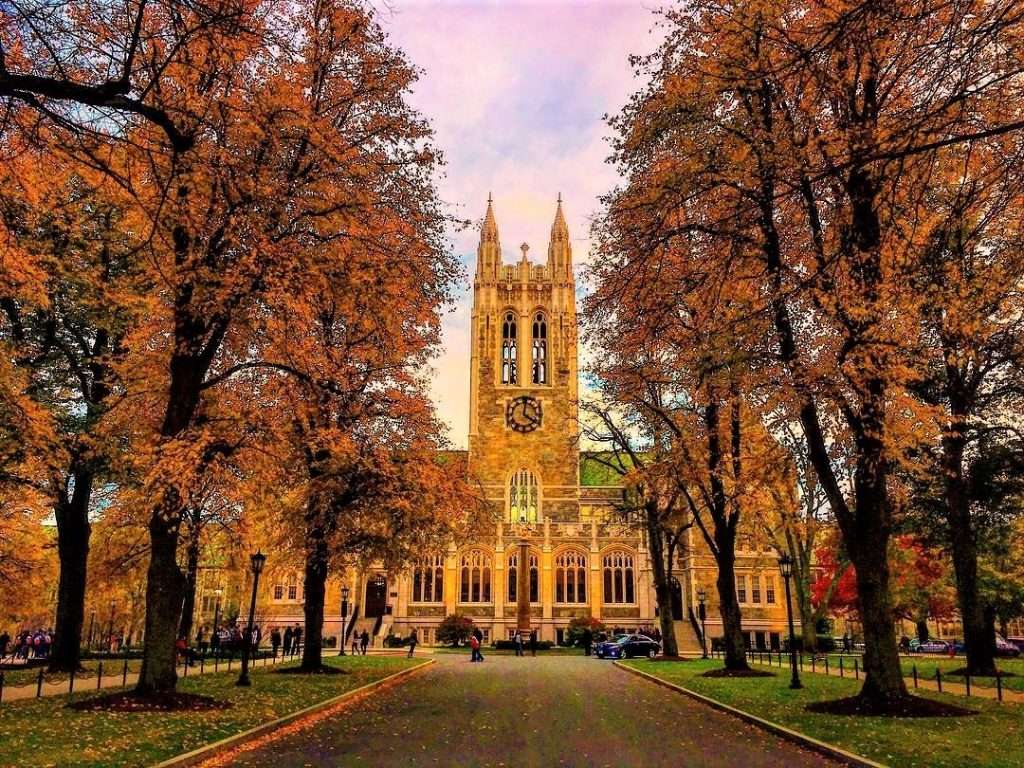College Intel
Boston College Admissions

Boston College was once described by The New York Times as a university on a mission to become “the nation’s Catholic intellectual powerhouse,” and “the center for the study of Roman Catholic theology in the United States.” With its $3.3 billion dollar endowment and its status as a leading Jesuit institution of higher learning, BC has arguably attained this lofty mission. Not only has the private research university drawn the likes of former Secretary of the Treasury Alicia Munnell and Nobel Peace Prize Laureate John Hume as faculty, but former Secretary of State John Kerry, CEO of CVS Health Karen Lynch, and actress and comedian Amy Poehler are all alumni. Depending on who you ask, such alumni are called either “Eagles” (in reference to the prestigious Division I athletics program’s mascot) or “Heightsmen and Heightswomen” (which stems from campus’ nickname, The Heights).
Most undergraduates enroll in the Robert J. Morrissey College of Arts and Sciences, which is the oldest of BC’s schools and programs. Other programs accepting undergraduates include The James A. Woods, S.J. College of Advancing Studies for students following nontraditional academic paths, and the Carroll School of Management, one of the most rigorous and highly-ranked undergraduate business programs in the country. The William F. Connell School of Nursing and the Carolyn A. and Peter S. Lynch School of Education and Human Development also run undergraduate programs. Associate degrees will soon be offered by the newly-minted Messina College, a two-year residential program, beginning in the 2024-25 academic year. And don’t let the “College” moniker fool you, Boston College also operates graduate schools for law, theology & ministry, and social work.
The Boston College Core Curriculum is shared among all undergraduates to “acquire a common intellectual foundation” across the student body. Coursework is required in the following disciplines: “Arts,” “Cultural Diversity,” “History,” “Literature,” “Mathematics,” “Natural Science,” “Philosophy,” “Social Sciences,” “Theology,” and “Writing.” By taking a “Complex Problems and Enduring Questions” course, taught by two faculty from different departments to encourage an interdisciplinary exploration of the subject material, students can satisfy two core requirements at once.
In 1863, Boston College’s charter was formally approved by the state of Massachusetts after decades of opposition from Boston’s Protestant establishment. The school initially served the city’s growing Irish immigrant population, and the first curriculum was strictly Jesuit, with required coursework in the Classics, philosophy, and Christian theology. In the 20th century, BC moved to its current location in gorgeous Chestnut Hill. A registered historic district, the main campus has buildings in the Gothic Revival style and houses a two million volume library system with some of the largest collections of Jesuit historical manuscripts in the United States.
If one were to arrive on campus today, one would find a spirited student body composed of an elite cache of learners who bring their talents to The Heights, the student-run newspaper, The Stylus, the undergraduate literary magazine, and the Cross and Crown Honor Society, for seniors who have distinguished themselves with academic prowess and leadership. If one attended a highly-anticipated game of the men’s hockey or women’s lacrosse teams, both of which have brought home national championships, one might hear everyone sing along to “For Boston,” the university’s fight song (and the first college fight song in U.S. history!).
Boston College has been no exception to the recent decline in acceptance rates for elite institutions in the United States. 5,511 applicants were accepted to the Class of 2027 from a pool of 36,525. This 15% acceptance rate was the lowest in the school’s history and is over twice as low as the Class of 2021 acceptance rate, which stood at 32%. According to Boston College Admissions, the BC experience is composed of a blend of “liberal arts,” “Jesuit, Catholic tradition,” and a “formative education” that cultivates holistic personal growth. Prospective applicants should consider that demonstrating an investment in Jesuit values, regardless of one’s own faith, is integral to crafting a competitive application. If you’re wondering how to best go about conveying your spiritual character, consulting with Ivy Coach will answer all of your questions and take you one step closer to sporting the school’s signature maroon and gold!
TOWARD THE CONQUEST OF ADMISSION
If you’re interested in Ivy Coach’s college counseling, fill out our complimentary consultation form and we’ll be in touch.
Get Started